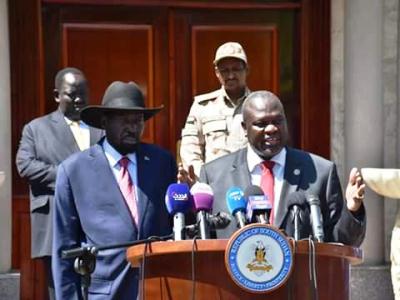South Sudan president says peace agreement imposed on him
September 2, 2016 (JUBA) – President Salva Kiir of South Sudan said the peace agreement he signed in August last year with his former first deputy president, Riek Machar, was imposed on him, and that difficulties in its implementation were not surprising.

President Kiir also challenged that there was need for dialogue over the proposed deployment of a third party foreign force to Juba so that their mandate is understood before they could deploy.
“When we accepted to sign the peace, we knew it was not going to be easy because certain provisions were imposed but we accepted because peace was very important and it remains the important thing even today,” he said.
“That is why we are saying that we should learn from mistakes made in the past. That instead of sending protection force, we need first to understand what they are coming to do, when they will come and how long they will stay in the country,” said president Kiir while meeting the head of the United Nations in South Sudan on Thursday, a day before the arrival of the UN Security Council’s members to Juba.
He reiterated that commitment and the readiness of his administration to negotiate with the United Nations Security Council within the framework of the outcome of the summit of the heads of state and government of the Intergovernmental Authority on Development held in Addis Ababa, Ethiopia, in August.
Cabinet affairs minister, Martin Elia Lomuro, a political ally of president Kiir from other political parties allied to the government, confirmed that the government had accepted in principle deployment of the troops but wanted to be involved in technical discussions before actual deployment can take place.
“We accepted in principle the deployment of these additional forces but we underlined that we need to be involved in other aspects, especially in technical discussions relating to their mandate, command, armament, when they will come and how long they will stay. These are things we highlighted in the letter we sent to the Security Council before the resolution was passed,” said Lomuro on Friday.
He said the government remains committed to implementing the peace agreement, adding it is also open for dialogue.
“A government which is not ready for implementation of the peace agreement will have its position clear. We are ready for dialogue on the deployment of the protection force but it should not be a tool to pressuring sovereign state. Dialogue should not undermine the authority and the institutions of a sovereign state,” he said.
UN Security Council in August passed a resolution which authorized deployment of 4,000 strong regional “protection force” to take charge of security and protection of civilians in Juba.
(ST)
